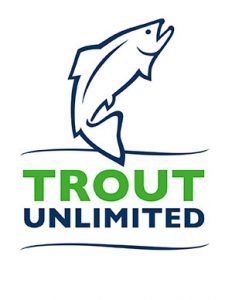 Left out is critical Snake River salmon recovery proposal championed by Trout Unlimited
Left out is critical Snake River salmon recovery proposal championed by Trout Unlimited
From TU:
Late last night the House passed the Bipartisan Infrastructure Investment and Jobs Act, delivering a major boost to coldwater conservation efforts. Already passed by the Senate and now headed to the president’s desk, this legislation makes major investments in helping the nation address the impacts of climate change, including some of the worst effects of the rapidly warming climate on trout and salmon.
Trout Unlimited (TU) lauded titles and provisions of the bill that will benefit coldwater fish and habitats, including abandoned mine restoration, removal of obsolete dams, watershed and forest restoration, replacement of old culverts, and increased efficiency of water management and transport systems. The bill represents the single largest investment in the nation’s waterways in a generation.
“This legislation is potentially transformational,” said Chris Wood, TU’s president and CEO. “It reflects the understanding—which TU has championed for years—that our natural landscapes and waterways are the most important part of the infrastructure that sustains us. And it directly tackles some of the biggest challenges to our infrastructure posed by climate change.”
Many roads, culverts, irrigation ditches and other infrastructure are in dire need of repair. Similarly, many streams, lakes and floodplains need restoration so they can continue to provide clean water and productive habitat that is more resilient to climate change. The infrastructure bill provides billions of dollars toward meeting these needs.
But the bill is also a lost opportunity. In particular, it fails to provide funding for U.S. Rep. Mike Simpson’s (R-ID) plan to remove four dams on Idaho’s lower Snake River and to invest in regional infrastructure alternatives. Thirty years and $17 billion in mitigation efforts have failed to slow the decline of what were once some of America’s most prolific salmon and steelhead runs. Numerous scientific studies affirm that the only way to recover Snake River salmon and steelhead is to remove the four dams.
Wood called on the Senate to move quickly to deliver other crucially needed investments in watershed and coldwater fish conservation by passing the Build Back Better Act. When paired with the infrastructure legislation, the Build Back Better Act would provide funding to substantially reduce greenhouse gas emissions, the root cause of climate change; bolster resilience and natural solutions to climate change through investment in coastal restoration, forest management, and Farm Bill conservation programs; and help make communities, lands, waters and fisheries more resilient to the effects of climate change, including more frequent and intense drought, wildfires and storms.
Core components of the infrastructure bill reflect some of TU’s highest priorities:
Abandoned mine remediation. The infrastructure bill reauthorizes the Abandoned Mine Reclamation Fund, the principal source of funding for cleaning up old coal mines dribbling toxic waste into trout streams across the East, and provide several billion dollars for new on-the-ground projects. It would also establish a new hardrock Abandoned Mine Lands (AML) program that—if funded—will help address the tens of thousands of legacy mines that currently pollute western watersheds.
Legacy Roads and Trails program. This program provides dedicated funding for repairing, upgrading and sometimes removing the more than 375,000 miles of roads, 12,000 bridges and 143,000 miles of trails managed by the U.S. Forest Service. This is a high priority for TU due to the widespread adverse impacts of poorly maintained roads and trails on trout and salmon streams.
Transportation culvert program. A new $1 billion grant program in the Department of Transportation would provide for removal and replacement of obsolete road culverts to benefit sea-run fisheries nationwide.
Regional restoration programs. Proven programs that help TU and other restoration experts repair and improve habitat, water quality and watershed function will receive substantial increases, including those on the Klamath and Delaware rivers, the Great Lakes, the Chesapeake Bay, Puget Sound and Lake Champlain.
Barrier removal and ecosystem restoration. The bill boosts support for fish passage barrier removal and watershed restoration, and provides substantial funding to help make forests and watersheds more resilient to the effects of climate change and wildfire.
Western water. The bill recognizes the critical role of water infrastructure and watershed health in improving water security as climate change makes conditions hotter and drier. It invests $400 million in the WaterSMART program, $100 million of which is dedicated to natural infrastructure projects; $100 million for watershed management projects; $250 million for aquatic ecosystem restoration and protection projects; $300 million to implement the Colorado River Basin Drought Contingency Plan; and $1 billion for water reuse and recycling.
Pre-disaster mitigation. FEMA’s Building Resilient Infrastructure and Communities program, which helps states, cities and Tribes prepare for future natural disasters, will receive $1 billion over five years to fund work such as flood resiliency projects that can protect communities while also reconnecting fish habitat.
“We applaud the passage of the infrastructure legislation and urge the Senate now to complete work on the Build Back Better Act bill to build on these investments to face climate change, support jobs, strengthen the economy, and boost ecosystem resiliency,” Wood added. “Trout Unlimited is grateful to President Biden and leaders in the House and Senate who put their shoulder to the wheel to get this historic legislation across the finish line. Their efforts will help us pass on a healthier world to future generations.”
Trout Unlimited is dedicated to caring for and recovering America’s rivers and streams, so our children can experience the joy of wild and native trout and salmon. TU brings to bear local, regional, and national grassroots organizing, durable partnerships, science-backed policy muscle, and legal firepower on behalf of trout and salmon fisheries, healthy waters and vibrant communities.



